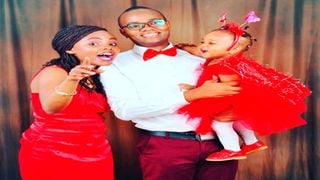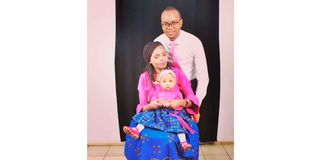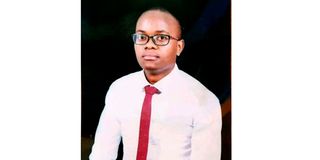
Victor Malombe Mutiso, 30, with his wife Nicole Munyiva and their daughter Zoe.
| Pool | Nation Media GroupDN2
Premium
Learning to see without my eyes
What you need to know:
- Victor Malombe had been experiencing issues with his eyesight from the time he was in primary school.
- It wasn’t until he was an adult that he was diagnosed with retinitis pigmentosa, a rare, inherited degenerative eye disease that causes severe vision impairment.
My name is Victor Malombe Mutiso. I am 30. I am an Advocate of the High Court of Kenya. I was admitted to the bar in 2017. Becoming a lawyer is a dream that I had worked very hard to achieve. In my primary and secondary school days at Unity Primary School and Upper Hill School in Nairobi, I often pictured myself rubbing shoulders with the crème de la crème in court corridors. I wanted to be the next Senior Counsel. But… this is not where my story begins. Allow me to retrace my steps.
I grew up in Umoja 1, Eastlands. I have an older sister, Catherine. There were only two of us in the family. My father worked as an accountant and my mother was a stay-at-home wife. While in Class Six in 2006, I began to notice that I couldn’t read textbooks and storybooks that had small fonts. I began to have difficulties taking part in sporting activities such as football. I remember how I’d get mocked for missing football kicks and passes whenever I went out playing with my friends at home and at school.
From the time I was 15, my vision got blurry intermittently. There were days I would see well and days when I really struggled. When my vision got more blurred, my father took me to an eye clinic where I was given medical spectacles.
At the time, it didn’t seem like a huge problem. After all, there were many people whose problematic eyesight ended once they started using glasses. Up until now, I can still recall how the optometrist assured my dad that I would be okay.
“Low vision is a common problem. He will get better and the glasses will improve his eyesight,” he said.
This boosted my faith. There was nothing gigantic to worry about. Perhaps in my naivety, I was also glad to wear spectacles. It made me look cool and intelligent. I quit sports and focused more on books. Whenever someone would try to tease me, I would make a rebuttal that glasses are worn by professors, and professors have no time for games. I was a professor in the making. More precisely, a law professor.
My confidence started wavering a few months later when the blurred vision returned despite my use of glasses. In the next few years, it became an annual ritual for me to get new lenses to magnify my deteriorating eyesight.

Victor Malombe Mutiso, 30, with his wife Nicole Munyiva and their daughter Zoe.
By the time I was preparing to sit for my KCPE exams in 2005, things had gotten so bad that I would frequently trip over things in front of me without knowing, or knock people walking in my direction. Most of my friends thought I was weird. By God’s grace, I did exceptionally well in the exams and managed to score an impressive 407 marks out of the possible 500. I got an admission letter to join Upper Hill School in Nairobi.
My sight did not get better in high school. To compensate for this shortfall, I became an attentive listener. I would listen more as the teachers lectured and do little writing because I couldn’t see the small fonts on the blackboard. It was heart-breaking. I couldn’t understand why I couldn’t see yet I had glasses.
I still think it was a miracle that I managed to pull through high school and sit for my KCSE in 2009. I scored an average grade of B Plain. In 2010, I joined the Catholic University of Eastern Africa for my undergraduate law degree. The path to becoming the law professor I had dreamed about in my primary school days was now clear.
But there was a small problem that wouldn’t go away: my eyesight kept deteriorating. In 2013, one year before I graduated, I began to seek a more advanced medical diagnosis. I visited one optometrist after the other in search of a diagnosis in vain.
In 2014, I graduated from the university with Second Class Honours, Upper Division. From 2015 to 2016, I took my postgraduate diploma in law at the Kenya School of Law and in 2017, I was admitted to the bar as an Advocate of the High Court of Kenya.
In September that year, I got married through a customary ceremony to Nicole Munyiva, who I had met during a church program in 2016. On February 7, 2018, we were blessed with our firstborn daughter Zoe. We are currently expecting our second born this month of May.
Fountain of comfort
Shortly after the birth of my daughter, I enrolled for a Master’s degree in law at the Management University of Africa. However, I dropped out after two semesters because by then, it had become too strenuous to cope with my deteriorating eyesight. I was now having regular headaches from straining to see, especially in low light conditions. I could not always recognise the faces of people.
My problematic eyesight was finally diagnosed in 2018 at the PCEA Lyons Eye Hospital in Kikuyu and the Muthaiga Eye Clinic, after getting a referral for specialised ophthalmology tests by a doctor I had seen in Nairobi.
I took three different tests at Kikuyu Hospital and Muthaiga Eye Clinic. The diagnosis came out similar in all three. I had a condition known as Retinitis Pigmentosa. I was later assessed by a government ophthalmologist who confirmed the same diagnosis.
Retinitis Pigmentosa is a rare degenerative condition in which the back wall of the eye known as the retina is damaged, causing severe vision impairment. In my case, my condition is compounded by maculopathy, a secondary progressive condition that also affects the back of the retina.
My condition is characterised by night blindness, impaired peripheral and central vision. I sought opinions from independent ophthalmologists to find out whether corrective surgery, laser treatment or any form of medication could help me see properly again. Their response was always the same. The condition had deteriorated to such an extent that it could not be remedied by corrective lenses.
This diagnosis was quite devastating. My self-esteem took a nosedive. My parents and sister were torn apart. My mother was depressed. Her prayer and dream to see her son conquer in the practice of law were wilting away like a dead flower.
Things took another turn for the worse in December last year when I lost my job at the National Council of Churches in Kenya. This crushed me. I couldn’t see. I had a wife and a young baby who were looking up to me for provision. My heart sank.
As a man, I was also worried over my young marriage. I had heard and read stories of marriages that collapsed after one spouse is diagnosed with a long term condition. I couldn’t help fearing the breakdown of mine. But I am forever grateful that Nicole turned out to be my fountain of comfort and cheer in my time of greatest need.

Victor Malombe Mutiso knows that there is a long road ahead, but he is confident that his dreams will come true.
I vividly remember how one evening she sat me by the bed and told me: “Victor when I decided to be your wife, I vowed to myself and to God that I’d love you through thick and thin. You may be losing your sight, but you’re not losing your worth as a man, as a fighter, and as the head of this family. You’re a soldier at war. Soldiers get wounded. But they never give up. You must rise and fight for us, fight for your family, and fight for yourself!”
These words were my turning point. I could either choose to host a pity party for myself, or dust my depression away and embrace my new reality. I have chosen to open the new page that life has given me. I have registered and joined the Kenya Society for the Blind and begun to undertake a rehabilitative course in mobility and adaptive computer training.
Today, I am also registered with the National Council for Persons with Disabilities, and the Association for the Physically Disabled. Currently, I am still unemployed and pleading for a job. But I will forever be indebted to Nicole for the love she has shown me and for standing in my place to keep the family going. It is never easy to be around someone who mostly needs a lending hand to perform simple tasks. But she has held my hand, her fingers intertwined with mine in a show of love and assurance of a lifelong companion. She is trained in media and communication, but she currently works in a small shop at Umoja, Eastlands, where we live.
Coming to terms with the reality that I may soon be totally blind has not been easy at all. My vision is now at just 20 per cent. But even as I take measures to ensure total blindness doesn’t find me ill-prepared, I will not lose hope that a remedy could be found. The doctors have advised me to keep going for medical reviews to ensure that my condition is under constant observation.
I have also been advised to be taking food supplements and special diets to manage the condition. This has not been easy due to my family’s limited source of income. Medical supplements have been especially expensive.
For 30 years, I have fought to be where I am. I have been an achiever and there is still a long road ahead for me to walk and achieve more. My blindness might be an unfortunate handicap, but I know that true vision doesn’t require eyes. Loss of sight never stopped Hellen Keller from becoming a global icon. “The only thing worse than being blind is having sight but no vision,” she said. I may have lost my sight, but I have not lost my vision. I will fight to be the successful attorney that I was born to be, and above all to be a loving and successful father to my children and my wife Nicole.”





